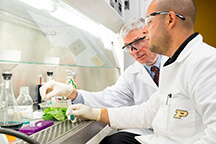Purdue food safety technology ready for commercial development
September 17, 2015
 |
|
Michael Ladisch, distinguished professor in the Department of Agricultural and Biological Engineering and Weldon School of Biomedical Engineering and director of the Laboratory of Renewable Resources Engineering, and Tommy Kreke, research staff member, examine fresh spinach and liquid samples that were created by Purdue technology more quickly than traditional methods. The technology to process the samples is being developed to meet industry standards. (Purdue Research Foundation photo) |
WEST LAFAYETTE, Ind. - Quality control facilities in the food industry and the federal government can use new technology developed by a team of Purdue University researchers to speed up the process of detecting pathogens like salmonella in fruits, vegetables, meat and other food.
According to the Centers for Disease Control and Prevention, an estimated one in six Americans is sickened by foodborne illnesses annually, resulting in about 3,000 deaths. Salmonella is the leading cause of deaths and hospitalizations related to foodborne illness, estimated to cause 380 deaths and 19,000 hospitalizations in the United States each year.
Michael Ladisch, distinguished professor in the Department of Agricultural and Biological Engineering and Weldon School of Biomedical Engineering and director of the Laboratory of Renewable Resources Engineering, led the team that created a method to process food samples much faster than traditional methods. The team included Ladisch; Eduardo Ximenes, bioprocess research scientist at LORRE; Kirk Foster, senior research engineer, and Jim Jones, software development, in the Weldon School of Biomedical Engineering; Tommy Kreke and Xingya Liu, research staff; Seockmo Ku, graduate student, and Haley Roos and Dayanne Moras, undergraduate students in LORRE; and Amanda Deering, research assistant professor in the Department of Food Science. In July, the technology won the grand prize in the 2014 FDA Food Safety Challenge. The team received $300,000 in prize money to further develop the technology.
Ladisch said the detection of food pathogens, or microorganisms that cause food-based illness, in the United States is excellent. He said the FDA, the U.S. Department of Agriculture and the food industry are able to detect pathogens, identify them and their sources.
"The challenge they now face is being able to test more samples more quickly, so that the time between when a food pathogen might be present and when it is detected would be shortened," he said. "Our technology makes it possible to process the samples more quickly, in hours instead of days."
The technology was developed through a grant from the USDA's Office of Scientific Quality Review, USDA Hatch funds and industrial funding.
"Microfiltration has been around more than 30 years, first used for filtering water and developed over the years for food materials. But the membrane fouls very quickly, which has been an impediment to use," he said. "We've improved the use and enabled rapid filtration with actual food extracts rather than needing microorganisms to buffer."
A video about the technology is available at https://youtu.be/pdJSDPnmIfs. The Purdue Research Foundation Office of Technology Commercialization has filed for U.S. and international patent protection for the innovation.
Ladisch said the team is looking to further develop the technology to meet industry standards.
"We are looking to scale up the technology from processing two samples at a time to eight and 16 samples and to work with industry, FDA and USDA researchers to further develop the capabilities," he said. "The ultimate goal is to provide our instrument in larger numbers to the food industry and government agencies."
The research was supported by the USDA Agricultural Research Service, through the National Food Safety Program (NP108 - James Lindsay, senior national program leader), which provides research funding to the Purdue Center for Food Safety Engineering, and also by the Department of Agricultural and Biological Engineering and the Weldon School of Biomedical Engineering. Former director Richard Linton, now dean of the College of Agriculture and Life Sciences at North Carolina State University, and Lisa Mauer, director of the Purdue Center for Food Safety Engineering, oversaw the project.
About Purdue Research Foundation Office of Technology Commercialization
The Purdue Research Foundation Office of Technology Commercialization operates one of the most comprehensive technology-transfer programs among leading research universities in the U.S. Services provided by this office support the economic development initiatives of Purdue University and benefit the university's academic activities. The office is managed by the Purdue Research Foundation, which received the 2014 Incubator Network of the Year from the National Business Incubation Association for its work in entrepreneurship. For more information about funding and investment opportunities in startups based on a Purdue innovation, contact the Purdue Foundry at foundry@prf.org. For more information on licensing a Purdue innovation, contact the Office of Technology Commercialization at innovation@prf.org.
Purdue Research Foundation contact: Steve Martin, 765-588-3342, sgmartin@prf.org
Source: Michael Ladisch, Michael Ladisch, 765-494-7022, ladisch@purdue.edu

